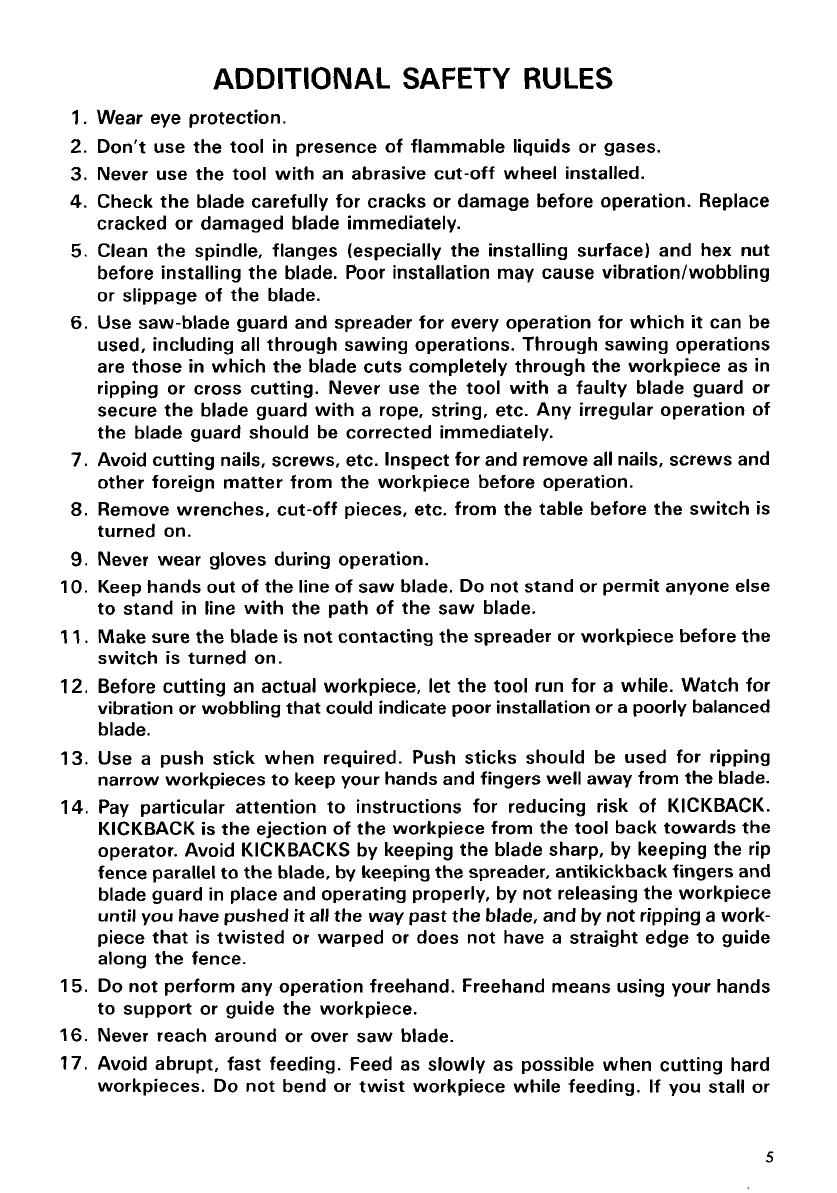
ADDITIONAL SAFETY RULES
1.
Wear eye protection.
2.
Don't use the tool
in
presence of flammable liquids or gases.
3.
Never use the tool with an abrasive cut-off wheel installed.
4.
Check the blade carefully for cracks or damage before operation. Replace
cracked or damaged blade immediately.
5.
Clean the spindle, flanges (especially the installing surface) and hex
nut
before installing the blade. Poor installation may cause vibration/wobbling
or slippage of the blade.
6.
Use saw-blade guard and spreader for every operation for which
it
can be
used, including all through sawing operations. Through sawing operations
are those
in
which the blade cuts completely through the workpiece as in
ripping or cross cutting. Never use the tool with a faulty blade guard or
secure the blade guard with a rope, string, etc. Any irregular operation of
the blade guard should be corrected immediately.
7.
Avoid cutting nails, screws, etc. Inspect for and remove all nails, screws and
other foreign matter from the workpiece before operation.
8.
Remove wrenches, cut-off pieces, etc. from the table before the switch is
turned on.
9.
Never wear gloves during operation.
IO.
Keep hands out of the line of saw blade.
Do
not stand or permit anyone else
to stand
in
line with the path of the saw blade.
11.
Make sure the blade is not contacting the spreader or workpiece before the
switch is turned on.
12.
Before cutting an actual workpiece, let the tool run for a while. Watch for
vibration or wobbling that could indicate poor installation or a poorly balanced
blade.
13.
Use a push stick when required. Push sticks should be used for ripping
narrow workpieces to keep your hands and fingers well away from the blade.
14.
Pay particular attention to instructions for reducing risk of KICKBACK.
KICKBACK is the ejection of the workpiece from the tool back towards the
operator. Avoid KICKBACKS by keeping the blade sharp, by keeping the rip
fence parallel to the blade, by keeping the spreader, antikickback fingers and
blade guard
in
place and operating properly, by not releasing the workpiece
until
you have pushed
it
all the way past the blade, and by not ripping a work-
piece that is twisted or warped or does not have a straight edge to guide
along the fence.
15.
Do not perform any operation freehand. Freehand means using your hands
to support or guide the workpiece.
16.
Never reach around or over saw blade.
17.
Avoid abrupt, fast feeding. Feed as slowly as possible when cutting hard
workpieces. Do not bend or twist workpiece while feeding. If you stall or
5


















